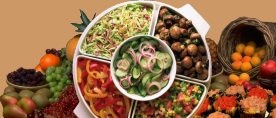What Is Good Food?
Food in the United States
Good food is great medicine. Sadly, good food isn't very easy to come by in this country. Why is that? Not because there's a shortage, like in some countries, but because poor food is much easier to come by, especially in urban areas.
Because of "advances" in food processing, cities can be supplied with food that has an amazingly long shelf life, allowing it to withstand traveling great distances and being stored for long periods. Restaurant chains and fast-food chains can now make their meals consistent across the country because their ingredients are more like factory parts than real food.
Advance to the Rear
But these same "advances" mean we are eating more chemicals and fewer mutrients than ever before. Not surprisingly, we're fatter and sicker than ever before as well (not as much from germ-borne diseases, but nutritional deficiency-borne maladies).
It also means that the character of chain food is largely an artificial veneer, having little to do with the actual food used and more to do with the processing formula. It's more about what's added than what's inherent.
Blind taste tests have shown the superior flavor of real food over prepackaged, processed food, but we become accustomed-or desensitized, more like-to the chemical flavors. We too often pick cheap and quick over rich and real, and pay a higher price overall.
The good news is that good food is still available and it doesn't have to break the bank. At this point in our history, tracking down good food can be downright inconvenient. You may have to find a local farm or farmer's market, buy a cow share, or plant a garden. What you're willing to pay in effort simply depends on what you're willing to gain or sacrifice in health.
How Good Is "Good"?
But the word "good" can apply to food in several ways. For example, one food that's nutritionally good is raw (unpasteurized) milk. But milk doesn't agree with everyone. So "good" food is not only nutritionally rich easy to get, reasonably priced, and delicious, but also compatible with the eater's system. There's a certain element of individual taste and tolerance when defining goodness.
You need to know or test each food's compatibility with your own system and those of any people for whom you may be providing meals. But in all cases, food that's truly good is always rich and real.
Food as Medicine
This may seem obvious, but let me say it anyway: Good food is food that's worth eating. What makes a food great medicine is its ability to strengthen and support rather than undermine your health. Sadly, the typical American diet is long on calories and additives and short on real nutrition-not the added "enriched" kind, but built-in nutrients.
Why is this so? Well, most of the people I know have little to no knowledge about—or even interest in—how food interacts with the body to build or destroy health. Grade schools seldom teach nutrition in any depth, implying that what you eat is not all that important. Information is available, of course, but doing your own research takes time.
Hopefully, these pages can help to fill the gap without much tedium. It would be great if I could have a hand in turning people to better diets and better health, less disease and less medication.
Can food prevent disease? Definitely. Can food cure disease? Yes, sometimes. And sometimes drugs are needed to kick-start the process. But personally, I would much rather prevent a disease than have to cure one! If it's true that "an ounce of prevention is worth a pound of cure," then each ounce of good food is truly great medicine.

